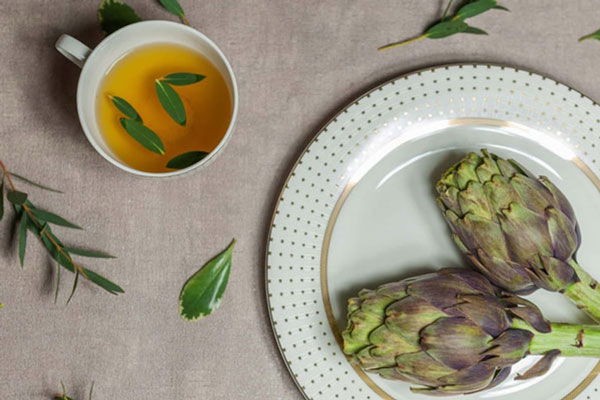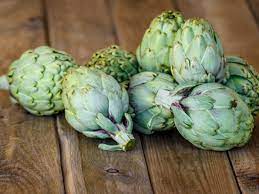Effects of artichoke on blood pressure: A systematic review and meta-analysis

Effects of artichoke on blood pressure: A systematic review and meta-analysis Artichoke supplementation may potentially lead to SBP and DBP reduction in hypertensive patients. In addition, artichoke supplementation for 12 weeks may significantly improve DBP.
Effects of artichoke on systolic blood pressure
Pooling nine RCTs (nine treatment arms) together did not show any significant change in systolic blood pressure (SBP) (WMD: -0.77 mmHg, 95 % CI: -2.76 to 1.22) compared to the control group. High heterogeneity was found among the studies (I2 = 97.8 %, P < 0.001). We found weight and health status were a source of heterogeneity. Subgroup analyses according to health status suggested that artichoke administration among hypertensive patients significantly decreased SBP (WMD: -3.19 mmHg, 95 % CI: −3.32 to −3.06), but not among NAFLD patients (WMD: −0.14 mmHg, 95 % CI: −3.53 to 3.24). Other subgroup analyses did not show a significant effect of artichoke administration on SBP.
Effects of artichoke on diastolic blood pressure

In the same nine studies, artichoke administration did not produce a significant effect on diastolic blood pressure (DBP) (WMD: -0.11 mmHg, 95 % CI: −1.72 to 1.50) compared to the control group. High heterogeneity was found among the studies (I2 = 97.8 %, P < 0.001). Subgroup analyses indicated that weight and health status as well as trial duration were sources of heterogeneity. Our results indicated artichoke supplementation for 12 weeks led to significantly decreased DBP (WMD: -2.33 mmHg, 95 % CI: −2.43 to −2.23), but not when supplementation only lasted 8 weeks (WMD: 0.80 mmHg, 95 % CI: −1.06 to 2.66). Furthermore, subgroup analyses according to health status revealed that artichoke supplementation reduced DBP in hypertensive patients (WMD: −2.33 mmHg, 95 % CI: −2.23 to −2.43) but not NAFLD patients (WMD: 1.73 mmHg, 95 % CI: −2.18 to 5.64). Other subgroup analyses did not show differing effects of artichoke administration on DBP
To the best of our knowledge, this meta-analysis with systematic review is the first to determine whether current evidence suggests a role for artichoke to reduce BP. In this study, we have compiled the evidence from eight RCTs, including 512 subjects, for meta-analysis. While artichoke supplementation is not supported for a global reduction in BP, our study suggests that artichoke supplementation may lower SBP and DBP among hypertensive patients, but to reduce DBP, the duration may need to be at least 12 weeks.
Several components found within artichokes could give potential mechanistic insight into the anti-hypertensive effects observed in the study. First, artichokes are very rich in antioxidant content. Some of the antioxidants found in artichokes include at least 27 different phenolic compounds, which consist of: mono- and di-caffeoylquinic acid (cynarin and chlorogenic acid), luteolins, cynaroside and caffeic acid, among others. Since oxidative stress has been hypothesized as a major regulator in the pathogenesis of hypertension, reducing oxidative stress may confer a subsequent reduction in BP. Artichoke extracts have distinct protective properties that aid against oxidative stress through reductions in intracellular reactive oxygen species (ROS) production and the reduction of oxidized low-density lipoprotein (ox-LDL) in human cells.
Additionally, another potent mechanism of artichoke administration that could contribute to the BP lowering effects could be the endothelial protection due to modulation of inflammatory factors. Miláčková et al. suggested that artichoke leaf extract reduced the expression of the inflammatory enzymes associated with Cyclooxygenase 2 (COX-2) and matrix metalloproteinase 2 (MMP-2), likely by inhibiting the activity of nuclear factor kappa-light-chain-enhancer of activated B cells (NF-κB) in human cells. Majeed et al. also demonstrated that artichoke extract administration led to a significant reduction in serum concentration of interleukin-6 (IL-6) and Complement C3a that was present with acute inflammation in Wistar rats. Hence, the beneficial effects of artichoke on inflammation and oxidative stress, which are risk factors for cardiovascular disease and hypertension, could suggest the use of artichoke to improve cardiovascular function.
Furthermore, artichokes are rich in prebiotics, namely inulin and fructooligosaccharides. Prebiotics are non-digestible and pass through the acidic portion of the upper gastrointestinal tract as substrates to the lower gastrointestinal tract. The anti-hypertensive properties of artichoke may also be connected to the anti-cholesterolemic effects which include decreased plasma concentrations of total cholesterol, LDL, and triglycerides. The insoluble prebiotics reaching the lower gastrointestinal tract may inhibit cholesterol and bile absorption through enhancing the viscosity of chime in the small intestine. As prebiotics bind bile acids and reduce solubilized cholesterol, cholesterol is reduced. This can contribute to an overall reduction in large artery stiffening, thereby lowering BP. However, the mild lipid-lowering effects of various nutraceuticals may not be potent enough to produce this kind of effect on BP. Another potential mechanism by which prebiotics may exert their effects on BP is through the attenuation of insulin resistance, as prebiotics have been shown to decrease post-prandial insulin secretion and improve glucose response. Insulin resistance is associated with reduced endothelium-dependent vasodilation, which plays a role in BP. Furthermore, prebiotics have been shown to increase calcium absorption in the gastrointestinal tract with a concomitant, associated reduction in BP. Therefore, prebiotics may stimulate anti-hypertensive effects through exerting anti-hypercholesterolemic effects, attenuating insulin resistance, or increasing calcium absorption.
In conclusion, artichokes reduce SBP and DBP in our meta-analysis. However, these effects may be contained to hypertensive patients, and DBP may only be reduced when the supplementation period is at least 12 weeks in duration. Similar effects were not seen in NAFLD patients. Further work is needed to understand the mechanisms that result in this reduction in BP, but the antioxidants, polyphenols, and prebiotics found in artichokes are likely contributors based on current evidence.
Reference:
Moradi, M., Sohrabi, G., Golbidi, M., Yarmohammadi, S., Hemati, N., Campbell, M. S., Moradi, S., Kermani, M. ali H., & Farzaei, M. H. (2021). Effects of artichoke on blood pressure: A systematic review and meta-analysis. Complementary Therapies in Medicine, 57, 102668–. https://doi.org/10.1016/j.ctim.2021.102668


